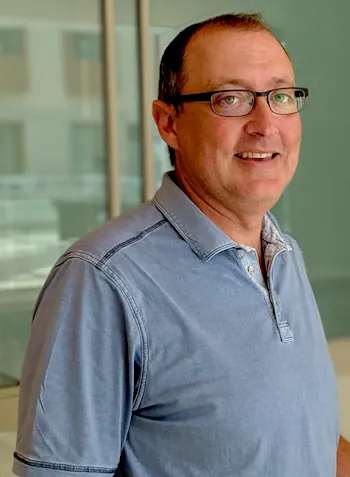
Out of more than 120 startup teams from all over the world, these three finalists will compete in the 2024 BIG IdeaBounce pitch contest at Washington University’s Olin Business School
An innovative software platform to allow universities to more deeply engage Gen-Z applicants and students already active on Instagram, Facebook, and TikTok.
Savvy pricing software that helps grocery stores sell their close-to-expiration date food items an an optimal price, helping to reduce food waste.
An online educational platform that teaches STEM literacy to K-12 deaf and hard-of-hearing students and their teachers.
THREE FINALISTS WILL SHOOT IT OUT ON WASHU OLIN’S CAMPUS FOR THE $50K TOP PRIZE

Doug Villhard, Olin’s academic director of entrepreneurship
Out of more than 120 startup teams from all over the world, the students behind these three big ideas are move to the finals of the 2024 BIG IdeaBounce pitch contest on Washington University’s Olin Business School campus. All three will compete for the top $50,000 prize in a Shark Tank-like competition before three entrepreneurial judges.
This year’s competition, powered by Poets&Quants for the third consecutive year, was one of the toughest ever. The contest attracted student teams from more than 65 universities and 14 countries. Startup ideas flowed in from Bangladesh, Chile, Ghana, India, Malaysia and Uganda. Judges first narrowed down the entries to 14 finalists which were then winnowed to the final three.
“As entrepreneurship programs continue to mature, we see stronger ideas and we see stronger storytelling of those ideas,” says Doug Villhard, academic director for entrepreneurship at Washington University. “Being a teacher but also a professional investor it’s fun to see these things come across my desk even though these are young companies and young founders.”
FINALIST: MEETYOURCLASS
The three finalists certainly meet the test. MeetYourClass CEO Blake Mischley, a computer science major at the University of Michigan, leads the team that is focused on creating stronger community for college students. By engaging applicants and students more deeply, Mischley’s startup team hopes to reduce social isolation among incoming freshmen and transfer students. “By fostering a sense of community and belonging, MeetYourClass plays a vital role in enhancing the overall university experience for students,” says Mischley.
Their product has significant traction, with more than 220,000 users across 350 different schools. Villhard, a serial entrepreneur himself, is impressed. “If you work hard to get a student, you want to keep them there,” adds Villhard. “A big part of that is the friendships and community they make. If you are a fan of higher education, this is a strategy to have happier, more connected students having a richer experience.”
FINALIST: SUSTAIN-A-PLATE
Sustain-A-Plate, an Olin Business School startup, has come up with a way for grocery stores to alleviate food waste and to increase profitabilty. Franklin Taylor, an MBA student who will graduate this May, leads a team that includes computer science and finance major Tanvi Jammula, entrepreneurship major Kelsey Kloezeman, finance major Anna Larizza, and computer science masters student Jason Ti.
The team estimates that a single U.S. grocery store discards roughly 670,000 pounds of consumable food annually, resulting in food waste of more than $3 million per store. “This act contributes 30% of the food waste in landfills and is the third-largest contributor to greenhouse gas emissions globally, highlighting a critical environmental and economic issue,” notes Taylor.
Villhard sizes up the problem Sustain-A-Plate in trying to solve. “Food waste is a big issue in a world where you can’t afford to waste food. That is a great problem to go after.”
FINALIST: ASL ASPIRE
Our third finalist, ASL Aspire comes from an idea hatched by students from the University of Illinois’ Gies College of Business and WashU’s Olin School. CEO Mona Jawad, a PhD candidate in speech and hearing science has teamed up with Ayesha Kazi, who is pursuing a master’s in computer science and business management, finance majors Hamnah Razzak and Manuel Jacobo to create a company that teaches STEM literacy to K-12 deaf students and their teachers through online games.
Deaf and hard of hearing children lack access to basic vocabulary to succeed in STEM, making them 70 times less likely to pursue STEM careers, and much more likely to be unemployed. It’s potentially a big market. Globally, more than 400 million deaf people learn in sign language, with 720,000 deaf students in North America alone.
Leveraging machine-learning, the group uses lessons in mini-games to help students practice new signs. A user-friendly dashboard allows teachers to track student progress and identify areas for intervention, making in-class instruction easier.
Like MeetYourClass, ASL Aspire has some early traction. Their games have been prototyped in four schools as part of a paid pilot program, with customer discovery interviews run on more than 250 decision makers and educators.
WATCH THE FULL COMPETITION ON APRIL 24 AT POETS&QUANTS
“It’s really clever what they are doing to help these students learn words used in science and technology,” explains Villhard. “In a couple of years, one of them may cure an important disease just because they had the confidence to enter the field.”
Which of these three teams emerges as the winner will be determined in a forthcoming shoot out at the Olin Business School at Washington University. Each team will be scored in nine areas: solution, traction, team, market, competition, value creation, prize use, overall presentation and, most importantly, the problem they are solving for customers.
But no one will go home empty handed. The third-place team will win $2,000, the second-place team will win $5,000 and the first-place team will win the grand prize of $50,000. The entire competition can be seen at Poets&Quants on April 24th.
Read and watch the initial pitches and two-minute video presentations of the finalists on the following pages.











Questions about this article? Email us or leave a comment below.